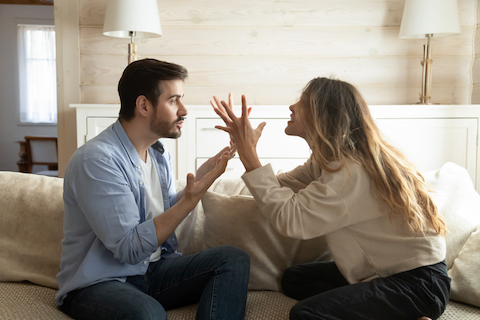July 12, 2021
Learn why it’s not healthy to be your partner’s therapist, and what else to do.

One of the important things I learned in my own marriage and in my work with clients is that a committed relationship is NOT supposed to be a therapeutic relationship. We can help each other to learn, grow and heal, but this is very different than a therapeutic relationship. In a marriage, or close committed relationship or friendship, we can help each other, but in a therapeutic relationship, one person is helping the other. This doesn’t work well in a partnership.
Caretakers often enter relationships to ‘fix’ their partner.
Caretakers often see themselves as healthier or more evolved than their partner, and they go about trying to change their partner – ‘for their own good.’ This puts the caretaker in a one-up position, which may make the other person feel one-down. I often hear from a client whose partner is trying to fix them, or who sees themselves as the ‘healthy one’, “My partner is much healthier and more evolved than I am.”
Since we come together at our common level of health or woundedness, I know that this statement isn’t true – that it’s indicative of an imbalance in the relationship and is what is causing some of the problems.
Sometimes one person expects the other person to listen the way a therapist would. A client in this position asked me,
“What should I do when he vents on me and expects me to listen to him like a therapist might listen to a client?”
Many people have a misunderstanding regarding what loving partners do for each other.
Do you expect your partner to be a dumping ground for your upsets? Do you expect your partner to be a trashcan for your anger at your boss or your co-worker? Do you expect your partner to lovingly absorb your frustration? Do you believe that you should be the trashcan for your partner?
It’s not loving of you to avoid responsibility for your own feelings by dumping them on your partner, and it’s not loving to yourself or to your partner to allow him or her to dump on you. There is no learning in this because there is no intent to learn.
If you are the dumper, you need to learn Inner Bonding so you can take responsibility for your own feelings.
If you are being dumped on and vented at, first you need to make sure that you let go of taking responsibility for the other person’s feelings and focus on taking care of yours. If it isn’t feeling good to you to listen to your partner, then you need to decide what is loving to you. You can move into an intent to learn with your partner about why he or she feels it is okay to vent on you, or you can lovingly disengage, letting your partner know that it isn’t feeling good to you to listen.
If your partner comes to you like a client comes to a therapist, you can let your partner know that you don’t want to be their therapist – that you want to learn and explore equally, with both of you open to learning about yourselves and each other.
It’s often best for processing to be done alone or with a therapist since it’s very hard for partners to not get triggered in each other’s processing.
Some couples believe that this is the way to connect, but if they are honest with themselves, they will see that processing about their relationship often leads to distance rather than to intimacy.
There is a difference between sharing your learning from your own Inner Bonding process with your partner and trying to process your relationship with your partner – which often has a covert intent to control. When each of you processes your own end of the system with your Inner Bonding process, and then come together to share and continue your learning, this can lead to connection and intimacy.
The real issue is – what is the intent? What is the intent in dumping or in processing? If the intent is to protect/avoid/control, then it’s not loving to participate. If the intent is to learn, then it will lead to intimacy and connection.
Heal your relationship with Dr. Margaret’s 30-Day online video relationship course: Wildly, Deeply, Joyously in Love.


 Listen to Dr. Margaret Paul's interview with
Listen to Dr. Margaret Paul's interview with 

